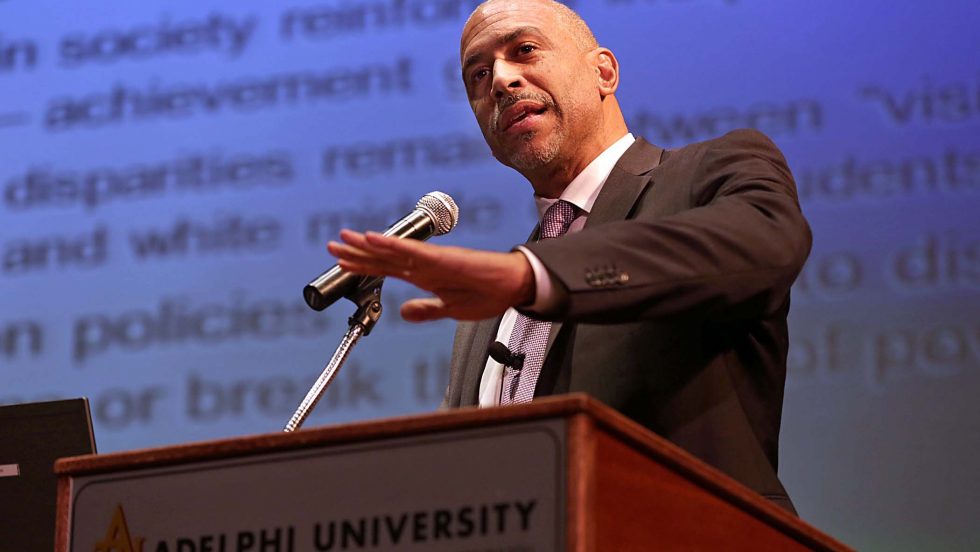
New York University professor Pedro Noguera initiated a deeply provocative discussion about the state of education.
In the second annual Ruth S. Ammon Endowed Lecture in Education at Adelphi University, Pedro Noguera, PhD, urged an audience of teachers, students, alumni, faculty and administrators to study successful public schools to find the solutions for closing the racial achievement gap in our classrooms.
“We should learn from schools that are working,” said Dr. Noguera, the Peter L. Agnew Professor of Education and executive director of the Metropolitan Center for Urban Education at New York University, in his lecture, “Challenging Racial Inequality in Our Schools,” in the Ruth S. Harley University Center’s Thomas Dixon Lovely Ballroom on April 2.
Fulfilling his promise to initiate “a deeply provocative discussion about the state of education today,” Dr. Noguera cited examples of model schools, from New York City to Los Angeles, Massachusetts to Texas and Pennsylvania to Toronto, where teachers and principals do not put test scores or their annual performance reviews ahead of getting students excited about learning.
Unfortunately, such schools are not the norm in many cities—despite state takeovers of school systems, politicians claiming they have the answers and a climate in which student underachievement is blamed on teachers, parents and kids rather than societal ills.
“What’s driving public policy now is the assumption that lazy people are working in our schools,” Dr. Noguera said. “We love football more than we love children. If we loved children more, we’d produce more doctors, lawyers, scientists and other professionals.”
The insightful, hourlong speech marked a homecoming of sorts for Dr. Noguera, who briefly attended public schools in Brentwood, New York.
However, Dr. Noguera grew up in Brownsville, a gang-infested neighborhood in Brooklyn, New York. Neither of his parents finished high school, but he earned a Ph.D. in Sociology from the University of California, Berkeley.
“The difference between a good school and a bad school is the culture the good school creates,” said Dr. Noguera, whose own story proves that children from underprivileged backgrounds succeed in school when teachers and principals establish a culture of learning and achievement. “If we pay more attention to how children learn outside of school, we might get some insights into how schools need to change.”
Incidentally, Scholar Teacher Education Program (S.T.E.P.) graduate Irene Pizzo, ’03, M.S. ’04, teaches science at KAPPA 5, a well-regarded middle school in Brownsville.
Jane Ashdown, Ph.D., dean of the Ruth S. Ammon School of Education, said in her introductory remarks that the decision to invite Dr. Noguera to lecture on racial inequality in schools rather than such trendy topics as Common Core or the Annual Professional Performance Review was deliberate.
“It is the role of universities to remind us of issues that we sometimes would rather ignore, issues that would otherwise remain invisible,” Dean Ashdown said. “Here on Long Island, we must not lose sight of the racial divisions in our school systems that contribute in well-documented ways to the underachievement of young people and to the persistent achievement gaps among racial groups.”